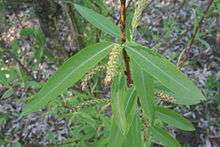Chosenia
| Chosenia arbutifolia | |
|---|---|
 | |
| Chosenia arbutifolia leaves and catkins | |
| Scientific classification | |
| Kingdom: | Plantae |
| (unranked): | Angiosperms |
| (unranked): | Eudicots |
| (unranked): | Rosids |
| Order: | Malpighiales |
| Family: | Salicaceae |
| Tribe: | Saliceae[1] |
| Genus: | Chosenia Nakai |
| Species: | C. arbutifolia |
| Binomial name | |
| Chosenia arbutifolia (Pall.) A.K.Skvortsov | |
Chosenia arbutifolia (syn. Salix arbutifolia Pall.)[2] is a flowering plant in the family Salicaceae, native to Korea, Sakhalin, Kamchatka and the Russian Far East.
Its name is taken from the Joseon dynasty which ruled Korea until 1897. It is the sole member of genus Chosenia, but is included within the closely related genus Salix by some authors.[3][4][5]
It is a deciduous, willow-like wind-pollinated tree generally reaching a height of 20-30 m with a columnar crown and grey-brown peeling bark. The leaves are 5-8 cm long and 1.5-2.3 cm broad, with a very finely serrated to nearly entire margin, and an acuminate apex. The flowers are aggregated in pendulous catkins 1–3 cm long; it is dioecious, with male and female flowers on separate trees. Chosenias are fast-growing pioneer trees on sand and pebble river banks.
References
- ↑ "Genus Chosenia". Taxonomy. UniProt. Retrieved 2010-02-04.
- ↑ Skvortsov, A. K. 1957. Commentationes de morphologia et systematica salicarum. IV. On the correct species epithet for Chosenia. — Bot. mat. Gerb. Bot. in-ta AN SSSR 18: 42–47.
- ↑ Flora of China: Chosenia arbutifolia
- ↑ Salicicola Articles: Chosenia I, II
- ↑ Korean Plant Names Index: Salix arbutifolia
| Wikimedia Commons has media related to Chosenia. |
